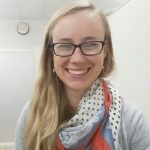By Betsy Evans
The AASHE Annual Conference and Expo in San Antonio in mid-October (October 15 – 18) was the confluence of a few thousand sustainability professionals and faculty from institutions of higher education around the world. And perhaps only one librarian. (My tweet got only three hearts and no replies!)
 Sul Ross State University, the public state University for which I work, has agreed to include STARS (Sustainability Tracking, Assessment and Rating System) in our strategic plan for the next five years. I know I’m not the only librarian involved in AASHE, because my inspiration to attend this conference was rooted in Amy Brunvand’s SustainRT webinar, “STARS and Beyond: Adventures of an embedded Librarian in the Campus Sustainability Office.”
Sul Ross State University, the public state University for which I work, has agreed to include STARS (Sustainability Tracking, Assessment and Rating System) in our strategic plan for the next five years. I know I’m not the only librarian involved in AASHE, because my inspiration to attend this conference was rooted in Amy Brunvand’s SustainRT webinar, “STARS and Beyond: Adventures of an embedded Librarian in the Campus Sustainability Office.”
I attended the conference as a representative of my institution’s Sustainability Council more than as a librarian, but – once a librarian, always a librarian – I chose to attend lectures on topics related to information literacy and was especially drawn toward ones dealing with mapping sustainability into the curriculum. It was during the Q&A of each session I attended that I made the big reveal by asking about how libraries played into these wonderfully inspirational projects, initiatives and research.
Only one session stood out as a true “library session,” that is, a session on the development of a textbook lending library at Connecticut College. A great idea, no doubt, but I could hardly restrain my frustration when I asked why they hadn’t included the institutional Library on their project when their main challenges were figuring out how to best catalog their collection and how to or whether to charge late fees. (The Lending Library: Addressing Textbook Affordability and Reducing Waste)
The opening keynote speaker, Katharine Hayhoe, the Director of the Climate Science Center at Texas Tech University who is well known for her ability to talk across the aisle about climate change, is always an inspiration. But it was Heather Hackman’s closing keynote, along with her October 16 session, “An Introduction to the Role of Race, Class and Gender Issues on Campus Sustainability Work,” who drove the theme of the conference – “Stronger in Solidarity” – reminding me of Hafuboti (Rebecca McCorkindale)’s popular 2017 campaign, “Libraries are for everyone.” (Hackman is a consultant focusing on social justice and equity.)
By asking questions and having conversations at the Conference’s many “coffee and networking” events and in the halls following sessions, people realized right before my eyes that the concepts of libraries and librarians include many foundations of sustainability. Yes, libraries are for everyone. Yes, libraries are unique places – third places, cornerstones of democracy, places for public trust.
On a personal level, this conference solidified a faculty-library divide that I’ve been feeling in my own institution. But there were moments of pure bliss, too: I had two wonderful conversations with students who were at AASHE for sustainability reasons but had been leaning toward librarianship as a field of study. They “got” it – and that was inspiring.
The takeaway? This annual conference is begging for more librarians to showcase sustainability initiatives and perhaps more importantly, to take part in conversations and level up institutional libraries as transformational spaces for sustainability thinking and leadership.
Biography:
Betsy Evans is a librarian living and working in Alpine, Texas, currently as the Education and Outreach Librarian at Sul Ross State University. Betsy received her M.S.I.S. from the University of North Texas in 2013 and worked in numerous roles for the Austin (Texas) Public Library before transitioning to academic librarianship in 2016. While interning for the Austin Public Library’s nationally-recognized Recycled Reads bookstore, Betsy served as SustainRT’s first Treasurer. Betsy currently serves on the Sul Ross State University Sustainability Council and the City of Alpine’s Keep Alpine Beautiful Committee. She is committed to better educating herself and her community about waste management and reduction.

 Sarah Klimek recently began working as the U.S. History Librarian at Michigan State University. She received her M.L.S. from Indiana University in May 2017, where she worked as a Public Services Assistant and a Teaching & Learning Graduate Assistant at the Herman B Wells Library. Prior to her M.L.S., she received a B.A. in history with a certificate in early childhood education from University of Maryland, Baltimore County. As an early-career librarian, Sarah is dedicated to supporting the growth of resilient and sustainable communities – she is a member of SustainRT and recently published an article on the availability of government information on sustainability in the Winter 2016 issue of
Sarah Klimek recently began working as the U.S. History Librarian at Michigan State University. She received her M.L.S. from Indiana University in May 2017, where she worked as a Public Services Assistant and a Teaching & Learning Graduate Assistant at the Herman B Wells Library. Prior to her M.L.S., she received a B.A. in history with a certificate in early childhood education from University of Maryland, Baltimore County. As an early-career librarian, Sarah is dedicated to supporting the growth of resilient and sustainable communities – she is a member of SustainRT and recently published an article on the availability of government information on sustainability in the Winter 2016 issue of